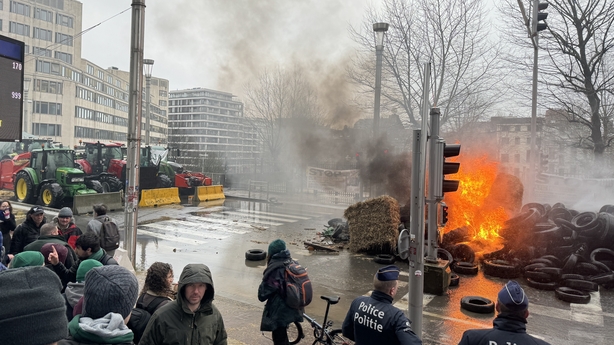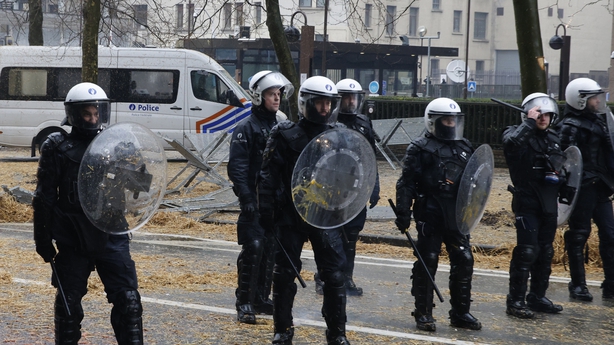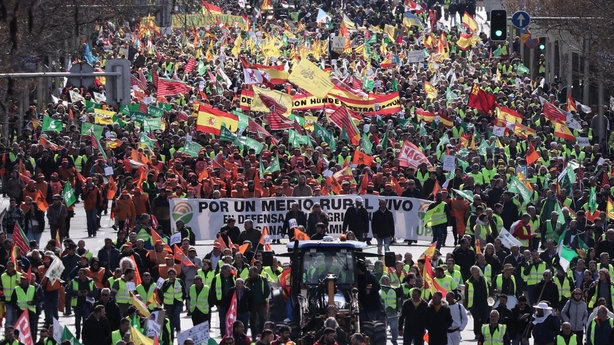Following farmer protests across Europe in recent months, including in Ireland, the EU has moved to reduce some of the administrative burden on farmers.
At a meeting of the EU Council of Agriculture Ministers today, proposals from the European Commission to simplify some aspects of the Common Agriculture Policy were discussed.
Those proposals include a reduction in on-farm visits by officials, simplification of the requirements that all lands are in Good Agricultural and Environmental Condition (GAEC), and flexibility when it comes to farmers who, due to unforeseen circumstances such as flooding, are unable to fulfill their CAP requirements.
The Commission is also to open an online survey for farmers to voice exactly what their concerns are, and what the sources of administrative burdens are.
While the ministers were meeting in Brussels, farmers protested outside and clashed with riot police, having driven their tractors into the city earlier.

Farmers set fire to piles of tyres in Brussels in a protest to demand EU action on issues ranging from cheap supermarket prices to free trade deals.
Riot police fired water cannon to put out flames, while similar protests were held in Poland and Spain.
Over 100 tractors were parked around the European Union institutions' headquarters, jamming parts of Brussels, a short distance from the cordoned off area where ministers were meeting.
Farmers across Europe have been protesting for weeks to demand action from politicians on an array of pressures they say the sector is under - from cheap supermarket prices, to low-cost imports that undercut local producers, to strenuous EU environmental rules.
Speaking after the meeting, Minister for Agriculture Charlie McConalogue said farmers are committed to improving sustainability of their operations but that it was important "we do not make life impossibly complex for them".
"The Council and the Commission must work quickly now to make sure the CAP can achieve its food security and environmental objectives in a way that is simple and practical for farmers and administrations," he said.
President of the European Council Charles Michel has previously said that farmers concerns will now be taken into account.

Read more: Traffic, airport disruption in Cork as farmers protest
"The Commission remains fully committed to delivering solutions to ease the pressure currently felt by our hard-working farming women and men. We are easing the administrative burden on our farmers to help them guarantee food security for European citizens," he said.
He added: "Simplification of our agriculture policies is a constant priority, at both EU and national level. With this range of actions, we are delivering on the pledge we made to our farmers to accelerate this discussion"
The EU Commissioner for Agriculture Januz Wojciechowski said that the message from farmers "is clear".
"They want to be working in their fields, not stuck behind files. In response, the Commission has identified a range of EU-level actions that could help to ease the administrative burden on farmers over the coming months and years.
"I welcome this renewed acceleration towards simplification, and I commit to working with member states and stakeholders on these actions and every initiative that will enable farmers to spend their working hours on what matters – supporting their families and producing our essential goods."
In response to weeks of protests by angry farmers, the EU had already weakened some parts of its flagship Green Deal environmental policies, scrapping a goal to cut farming emissions from its 2040 climate roadmap.
The EU has also withdrawn a law to reduce pesticides and delayed a target for farmers to leave some land fallow to improve biodiversity.
"We must change a lot in the CAP, because this Green Deal and the green targets that we have are almost impossible tor each," Latvian Agriculture Minister Armands Krauze said, referring to the EU's common agricultural policy (CAP).
French Agriculture Minister Marc Fesneau added: "I'm not saying that we cannot do the (green) transition, but there is a need to take into account the reality on the ground."
Farmers' demands also include ending free trade agreements, which farmers say have led to cheaper imports from countries where producers face less stringent environmental standards than those of the EU.
A stage set up at the protest site was draped with a sign that said "stop EU Mercosur" - a reference to negotiations to conclude a trade agreement with the Mercosur group of South American countries.
'The government doesn't care'
Polish farmers blocked the highway at a border crossing with Germany.
Farmers planned to block the Swiecko crossing with Germany until early afternoon, said Adrian Wawrzyniak, a spokesperson for the Solidarity farmers' union.

"As far as I know, there are also German farmers on the German side, the crossing is blocked from both sides," he said.
"This is a show of common solidarity, that both Polish and German farmers will not allow these goods from Ukraine to continue to enter the European market. It's a common cause."
Farmers' trade unions plan a big protest in the Polish capital Warsaw tomorrow.
Ukrainian Deputy Prime Minister Oleksandr Kubrakov has urged Poland to punish those responsible for spills of a Ukrainian grain cargo on the Polish side of the border at the weekend.
Elsewhere thousands of Spanish farmers protested outside the agriculture ministry in central Madrid, holding placards that read: "The countryside is in the abyss and the government doesn't care."
Maria Villoslada Garcia, a 43-year-old winegrower from northern Spain, told AFP: "We expect solutions, but quickly" from the EU and Spain "because we are being suffocated" and "our work costs more than what it pays."
Victor Iglesias, a 24-year-old grain farmer from central Spain, said: "There are fewer and fewer young people (in the profession) and that's a consequence of... the costs."
The rolling protests - which saw French President Emmanuel Macron angrily heckled over the weekend - have unnerved EU leaders concerned they could prove a boon for the far-right at European elections in June.
Additional reporting Reuters







